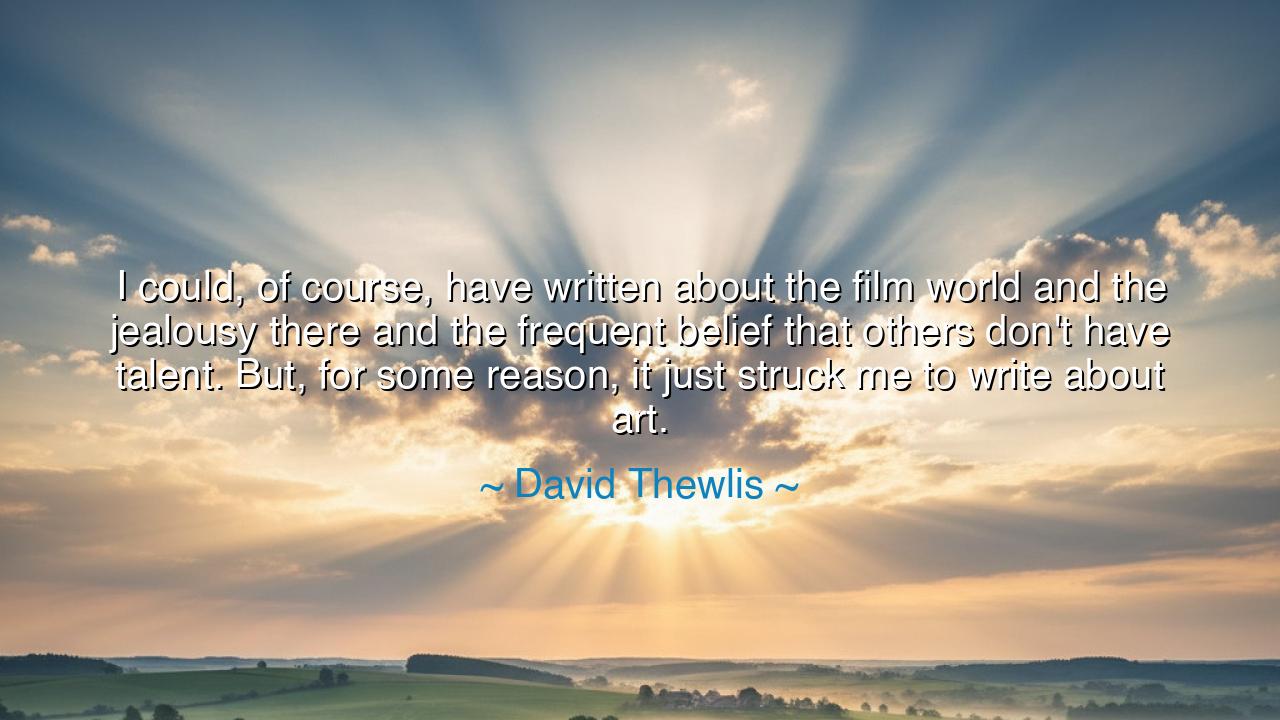
I could, of course, have written about the film world and the
I could, of course, have written about the film world and the jealousy there and the frequent belief that others don't have talent. But, for some reason, it just struck me to write about art.






In the thoughtful and introspective words of David Thewlis, “I could, of course, have written about the film world and the jealousy there and the frequent belief that others don’t have talent. But, for some reason, it just struck me to write about art.” These words, spoken with the humility of an artist who has seen both the light and shadow of creativity, carry a wisdom that transcends their surface. For beneath them lies an ancient truth — that in every human endeavor where beauty and ambition dwell, so too does jealousy, that quiet serpent which coils around the heart of creation. Yet Thewlis, in his choice, reveals something deeper: that to dwell on jealousy is to remain among the petty, but to write of art is to rise toward the eternal.
The origin of this quote lies in Thewlis’s reflections as both actor and writer — a man who has walked within the shimmering halls of the film world, where applause is loud and envy louder still. Having known both fame and solitude, he understood that art, whether performed or painted, attracts not only admiration but comparison. Within the creative world, where souls labor to give shape to beauty, it is common to see the poison of jealousy spread — artists doubting one another, critics diminishing what they cannot understand, and envy masquerading as judgment. Yet Thewlis, with the wisdom of restraint, chose not to mirror that bitterness in his work. Instead, he turned toward art itself, toward that which endures beyond the quarrels of ego.
In choosing art over envy, Thewlis chose transcendence over reaction. He recognized that jealousy belongs to the realm of the small — to those who measure their worth by comparison, rather than by truth. But art, when it is pure, is free of such chains. It does not compete; it reveals. It does not diminish another’s light; it seeks its own. To write of art, then, is to honor what unites the soul of humanity rather than what divides it. The jealous artist says, “I want to be greater than you.” The true artist says, “I wish to see what beauty may yet be born.” In this distinction lies the difference between vanity and vision, between noise and creation.
History itself is filled with the battle between jealousy and art. Think of Michelangelo and Leonardo da Vinci, two giants of the Renaissance, whose rivalry shook the very foundations of Florence. Each sought perfection; each eyed the other’s genius with both admiration and unease. And yet, from that tension, the world received The Last Supper, the David, and the ceiling of the Sistine Chapel — works not of envy, but of transcendence. Though their hearts may have wrestled with rivalry, their art rose above it. It is as if creation itself demanded that the fire of jealousy be purified into light. Such is the alchemy of the true artist: to transform emotion into expression, envy into excellence.
But Thewlis’s insight reaches further still. His words speak not only to the artist, but to all who labor under the gaze of others. In every craft — in science, leadership, or daily life — there are those who spend their strength proving themselves against another, rather than cultivating their own path. They are like mirrors facing mirrors, reflecting endlessly without ever seeing the world outside. Thewlis reminds us that to live in this way is to waste one’s gift. Art, whether of the brush or of the soul, demands independence — a turning inward toward what is true, and a turning outward toward what uplifts.
There is, too, a quiet humility in his words. Thewlis does not deny the jealousy that exists in the world he knows; he simply chooses not to feed it. This is the mark of the wise — not to be blind to darkness, but to refuse to give it the power of creation. He recognizes that art has the strength to redeem even the most corrupt emotions. Where envy divides, art unites; where bitterness corrodes, art restores. The artist who understands this becomes not a competitor, but a vessel — one who channels what is eternal through the fragile medium of the human heart.
The lesson, dear listener, is one of profound simplicity: do not let jealousy rule your craft, nor let comparison define your worth. Whether you create with words, deeds, or dreams, remember that your purpose is not to surpass another, but to express truth. The jealous man seeks victory; the artist seeks meaning. Therefore, choose to build, not to envy; to understand, not to judge. Let your work speak of art, not of anger.
So let the words of David Thewlis echo through the corridors of every creative soul: “It just struck me to write about art.” In that choice lies liberation — the turning away from the fleeting quarrels of ego toward the timeless communion of creation. For in the end, all envy fades, but art endures. The jealous heart perishes with its comparisons, but the artist’s heart, devoted to truth and beauty, lives beyond his years. And thus, those who rise above jealousy and devote themselves to art do not merely create works of beauty — they themselves become works of art.






AAdministratorAdministrator
Welcome, honored guests. Please leave a comment, we will respond soon